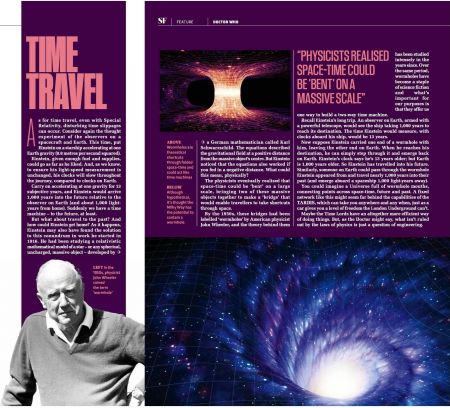Time Travel
- Publication: BBC Science Focus
- Date: Nov. 2023
- Author:
- Page: 73
- Language: English
As for time travel, even with Special Relativity, disturbing time slippages can occur. Consider again the thought experiment of the observers on a spacecraft and Earth. This time, put Einstein on a starship accelerating at one Earth gravity (9.8 metres per second squared).
Einstein, given enough fuel and supplies, could go as far as he liked. And, as we know, to ensure his light-speed measurement is unchanged, his clocks will slow throughout the journey, compared to clocks on Earth.
Carry on accelerating at one gravity for 13 subjective years, and Einstein would arrive 1,000 years into the future relative to the observer on Earth (and about 1,000 light-years from home). Suddenly we have a time machine - to the future, at least.
But what about travel to the past? And how could Einstein get home? As it happens, Einstein may also have found the solution to this conundrum in work he started in 1916. He had been studying a relativistic mathematical model of a star - or any spherical, uncharged, massive object - developed by a German mathematician called Karl Schwarzschild. The equations described the gravitational field at a positive distance from the massive object's centre. But Einstein noticed that the equations also worked if you fed in a negative distance. What could this mean, physically?
The physicists eventually realised that space-time could be 'bent' on a large scale, bringing two of these massive objects together to make a 'bridge' that would enable travellers to take shortcuts through space.
By the 1950s, these bridges had been labelled 'wormholes' by American physicist John Wheeler, and the theory behind them has been studied intensely in the years since. Over the same period, wormholes have become a staple of science fiction and what's important for our purposes is that they offer us one way to build a two-way time machine.
Recall Einstein's long trip. An observer on Earth, armed with a powerful telescope, would see the ship taking 1,000 years to reach its destination. The time Einstein would measure, with clocks aboard his ship, would be 13 years.
Now suppose Einstein carried one end of a wormhole with him, leaving the other end on Earth. When he reaches his destination, he can simply step through it and emerge back on Earth. Einstein's clock says he's 13 years older; but Earth is 1,000 years older. So Einstein has travelled into his future. Similarly, someone on Earth could pass through the wormhole Einstein appeared from and travel nearly 1,000 years into their past (and emerge aboard a spaceship 1,000 light-years away).
You could imagine a Universe full of wormhole mouths, connecting points across space-time, future and past. A fixed network like this might seem far behind the capabilities of the TARDIS, which can take you anywhere and any when, just as a car gives you a level of freedom the London Underground can't.
Maybe the Time Lords have an altogether more efficient way of doing things. But, as the Doctor might say, what isn't ruled out by the laws of physics is just a question of engineering.
Captions:
LEFT In the 1950s, physicist John Wheeler coined the term 'wormhole'
ABOVE Wormholes are theoretical shortcuts through folded space-time and could act like time machines
BELOW Although hypothetical, it's thought the Milky Way has the potential to contain a wormhole
Disclaimer: These citations are created on-the-fly using primitive parsing techniques. You should double-check all citations. Send feedback to whovian@cuttingsarchive.org
- APA 6th ed.: (Nov. 2023). Time Travel. BBC Science Focus p. 73.
- MLA 7th ed.: "Time Travel." BBC Science Focus [add city] Nov. 2023, 73. Print.
- Chicago 15th ed.: "Time Travel." BBC Science Focus, edition, sec., Nov. 2023
- Turabian: "Time Travel." BBC Science Focus, Nov. 2023, section, 73 edition.
- Wikipedia (this article): <ref>{{cite news| title=Time Travel | url=http://cuttingsarchive.org/index.php/Time_Travel | work=BBC Science Focus | pages=73 | date=Nov. 2023 | via=Doctor Who Cuttings Archive | accessdate=21 December 2025 }}</ref>
- Wikipedia (this page): <ref>{{cite web | title=Time Travel | url=http://cuttingsarchive.org/index.php/Time_Travel | work=Doctor Who Cuttings Archive | accessdate=21 December 2025}}</ref>

